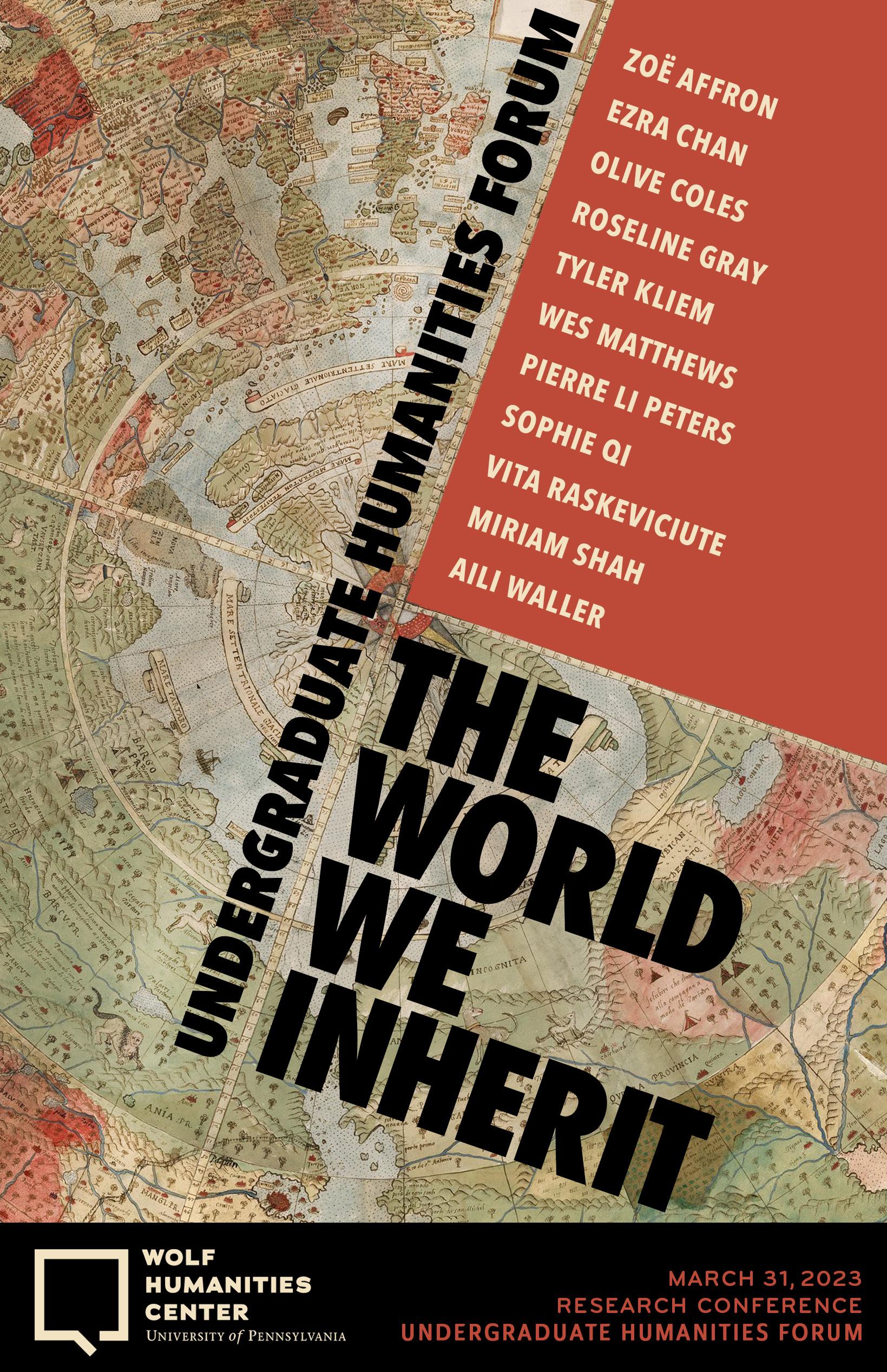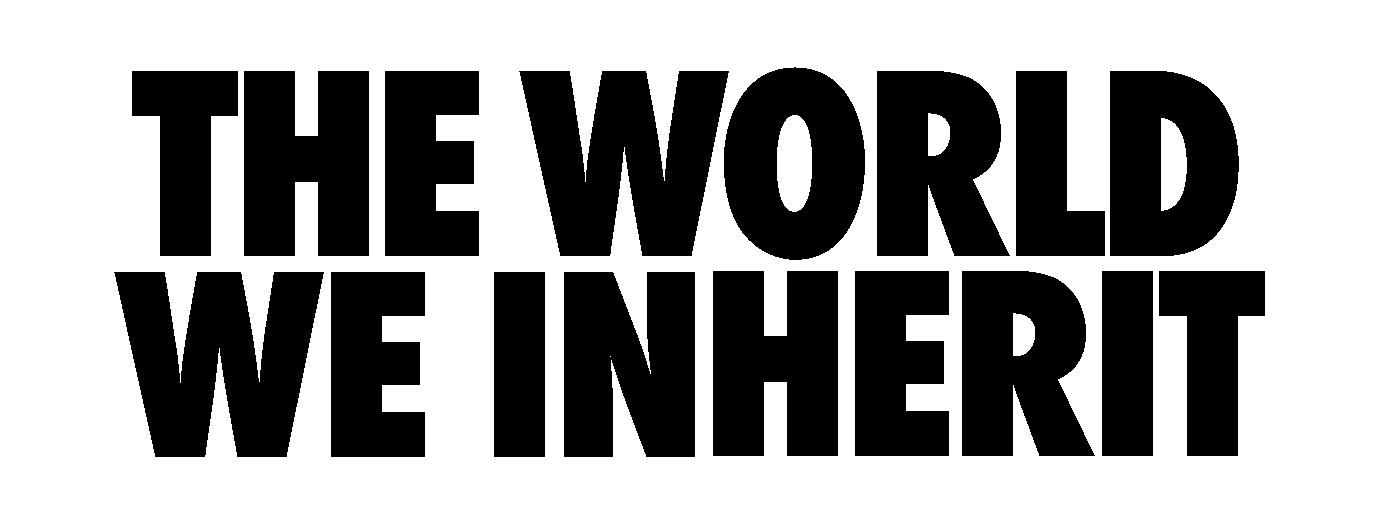
THE WOLF HUMANITIES CENTER AT THE UNIVERSITY OF PENNSYLVANIA IS AN INNOVATIVE RESEARCH CENTER
STRIVING TO DEMONSTRATE HOW VITAL THE HUMANITIES ARE TO ALL ASPECTS OF OUR LIVES. THE CENTER SUPPORTS AN ANNUAL THEME-BASED FELLOWSHIP PROGRAM, A SERIES OF PUBLIC EVENTS, AND A VARIETY OF RESEARCH-RELATED ACTIVITIES FOR MEMBERS OF THE PENN ACADEMIC COMMUNITY. WITH THESE AND OTHER EFFORTS, SUCH AS OUR HUMANITIES AT LARGE COLLABORATIONS, WE INVITE PEOPLE OF ALL AGES AND PLACES TO JOIN US IN A HUMANISTIC EXPLORATION OF THE MOST IMPORTANT ISSUES OF OUR TIME.
STAY CONNECTED
wolfhumanities.upenn.edu
Cover map detail > Composite: Tavola 1-60. (Map of the World with additional spheres and labels in the four corners; rotated 180 degrees), 1587. Monte (Monti), Urbano, 1544–1613. David Rumsey Historical Map Collection.
March 31, 2023
Wolf Humanities Center
School of Arts & Sciences
University of Pennsylvania
Class of 1978 Orrery Pavilion
Kislak Center for Special Collections, Rare Books and Manuscripts Van Pelt Library 3420 Walnut Street, Philadelphia
A program of the Wolf Humanities Center's 2022–2023 Forum on Heritage


UNDERGRADUATE HUMANITIES FORUM RESEARCH FELLOWS, 2022–2023
Zoë Affron
Ezra Chan
Olive Coles
Roseline Gray
Tyler Kliem
Wes Matthews
Pierre Li Peters
Sophie Qi
Vita Raskeviciute
Miriam Shah
Aili Waller
UNDERGRADUATE HUMANITIES FORUM DIRECTOR
Julia Verkholantsev
Associate Professor and Undergraduate Chair, Russian and East European Studies
Founder and Director, Program in Global Medievel and Renaissance Studies
University of Pennsylvania
Welcome, all, to “The World We Inherit,” the 22nd annual research conference of the Wolf Humanities Center's Undergraduate Humanities Forum at the University of Pennsylvania. We are beyond excited to host you in the beautiful Kislak Center to celebrate the humanities and share what we have been working on over the past few months. Our 2022–2023 theme is heritage — in all of its forms. As our fellows present their research today, we invite you to consider the meaning of heritage in your own experience, and how humanistic disciplines can help us to better understand the role of the past in our present moment.
As a group, the Wolf Undergraduate Fellows have spent the year discussing and working with the role of heritage in our various disciplines. We have visited museums and rare book archives, and hosted visiting musicians and visual artists in conversation about their work and the concept of heritage. We bring together voices from studies of literature, art history, anthropology, musicology, and even international politics. Learning from one another has been as much a part of the fellowship experience as the development of our independent research projects. We hope that the richness of the interdisciplinary work and spirit of the Wolf Humanities Center shines through as we share our research in dialogue with one another.
Our presentation today is organized in four panels, according to the different themes which underpin fellows’ projects. After opening remarks from Julia Verkholantsev, Director of the Undergraduate Humanities Forum, we will start with “Imagining Heritage: History in Russian National Identity.” The second panel is titled “Creating National Identities: Myth, Exceptionalism, and Nation Building in Colonial and Post-Colonial States,” followed by “Anthropological Voyages into Material, Culture, Coloniality, and Being.” Our final presentations will be a part of “Artistic and Literary Networks”.
The Undergraduate Humanities Forum, its meetings, and events would not be possible without the incredible support of the Wolf Humanities Center staff, as well as the collaboration of faculty advisors, panel moderators, librarians, and museum curators across Penn’s campus. We are extremely grateful for the work of Director Jamal J. Elias, Associate Director Sara Varney, as well as that of Administrative Coordinators Pamela Horn and Steven Perez. The wisdom and guidance of Julia Verkholantsev, who has worked tirelessly with the undergraduate fellows this year, has been invaluable. These individuals have helped to foster a very special environment of scholarly exchange and camaraderie, which we are so excited to celebrate here today. We thank all of you for coming out today and for your continued support.
Roseline Gray and Pierre Li Peters 2022–2023 Executive Board and Research Fellows Undergraduate Humanities Forum
WELCOME
ACKNOWLEDGEMENTS
The fellows also thank the following individuals for their generous contributions, guidance, and support.
Juozapas Blažiūnas
S. Pearl Brilmyer
Jane Dmochowski
Kathleen Foster
Kathryn Hellerstein
Peter Holquist
Sarah Kuaiwa
Michael Leja
Beth Linker
Sarah Linn
Brendan O'Leary
Mitchell Orenstein
Deven Patel
Alex Pezzati
Kevin M.F. Platt
Lauren Ristvet
Timothy Rommen
Elizabeth Shulman-Nadolny
Naomi Slipp
Samuel Spinner
Jim Sykes
Deborah Thomas
Jim Tranquada
Whitney Trettien
Julia Verkholantsev
Arthur Waldron
Nuni-Lyn Walsh
Seth Wolitz
The Undergraduate Humanities Forum would like to recognize that the University of Pennsylvania was built on land once known as Lënapehòkink, the ancestral homelands of the Lenape peoples, who have lived on and cared for it for thousands of years. Today, this space is home to diverse communities who have all been shaped by the land, waters, and natural resources of this region. It is important to acknowledge the Lenape peoples, their ancestors, and their descendants who were forcibly removed from their homelands through colonization, displacement, and genocide. We honor their resilience and strength in the face of these historical injustices and recognize their ongoing contributions to the cultural fabric of our communities.
9:00–9:30 AM
BREAKFAST AND REGISTRATION
9:30 AM
OPENING REMARKS
Julia Verkholantsev, Director, Undergraduate Humanities Forum; Associate Professor and Undergraduate Chair, Russian and East European Studies; Founder and Director, Program in Global Medieval & Renaissance Studies
9:45–10:45 AM
IMAGINING HERITAGE : HISTORY IN RUSSIAN NATIONAL IDENTITY
MODERATOR: Peter Holquist, Ronald S. Lauder Endowed Term Associate Professor of History
Olive Coles | Political Science, Russian and East European Studies
Finding the Words: Searching for ‘Truth’ in the Shadows of Soviet Past
Roseline Gray | International Relations, Russian and East European Studies
Historical Imagination and Political Power: The Role of Premodern Narratives in Contemporary Russian National Identity
11:00 AM–12:30 PM
CREATING NATIONAL IDENTITIES: MYTH, EXCEPTIONALISM, AND NATION BUILDING IN COLONIAL AND POST-COLONIAL STATES
MODERATOR: Brendan O’Leary, Lauder Professor of Political Science
Sophie Qi | Health and Societies, History
Miss Super Clean: Public Health as Nation Building in Late-Colonial Period Hong Kong
Vita Raskeviciute | International Relations, Russian and East European Studies
On the Brink of Independence: Public Opinion of What it Means to Be Lithuanian
Miriam Shah | Intellectual History
Inheriting Political Myth: India’s National Identity?

1:30–3:00 PM
ANTHROPOLOGICAL VOYAGES INTO MATERIAL CULTURE, COLONIALITY, AND BEING
MODERATOR: Deborah Thomas, R. Jean Brownlee Professor of Anthropology; Director, Center for Experimental Ethnography
Ezra Chan | Health and Societies
Legacies of Loss: An Ethical Analysis of Human Remains, Modern Collections, and Colonialism

Wes Matthews | Anthropology
Architecture Of Disillusion: A Qualitative Study of Nihilism and Spirituality Among Black Men in Hip Hop Performance
Pierre Li Peters | Music, Cultural Anthropology
BRING IT ON HOME: A Decolonial Analysis of Musical Instruments in Museum Archives
3:15–4:45PM
ARTISTIC AND LITERARY NETWORKS
MODERATOR: Whitney Trettien, Assistant Professor of English
Zoë Affron | English, Environmental Studies
Modernist Ecologies: The Short Fiction of E.M. Forster and Virginia Woolf
Tyler Kliem | Comparative Literature, Design
Blending Poetics and the Avant-Garde: The Constructed Yidishkeyt in the Works of Yiddish Literary and Art Collectives in Europe, 1918–1924
Aili Waller | History of Art
Using Genealogy to Recover Lost Artists: The Case of Josephine Walters
4:45 PM
CLOSING REMARKS
Roseline Gray and Pierre Li Peters, Executive Board and Research Fellows, Undergraduate Humanities Forum
ABSTRACTS
Zoë Affron
English, Environmental Studies; CAS, 2023
Modernist Ecologies: The Short Fiction of E.M. Forster and Virginia Woolf
Literary modernism has a particular association with urban spaces and aesthetics. A product of the early 20th century, modern writing often reflects the technological and industrial advancements of the era. Yet, though not always as explicitly, many of these same texts also engage closely with questions regarding some element of the natural world, ranging from wilderness to climate to resource conservation. This project identifies trends in the treatment of environmental concerns by members of the Bloomsbury Group, a leading collective of writers, artists, and intellectuals active in early 20th-century London. It does so through a close analysis of two works of short fiction by prominent members of the group: “The Machine Stops” (1909) by E.M. Forster and “Kew Gardens'' (1919) by Virginia Woolf. These stories are set in remarkably contrasting environments, as Forster explores the relationship between humans and nature in a dystopian, mechanical world, while Woolf does so in the context of a real, natural ecosystem. I argue, however, that both authors use distinctly modernist writing practices and perspectives to reject normative literary standards of setting, probability, and individual anthropocentrism in their environmental narratives, as required by contemporary writer Amitav Ghosh in The Great Derangement: Climate Change and the Unthinkable (2016).
Ezra Chan
Health and Societies; CAS, 2024
Legacies of Loss: An
Ethical Analysis of Human Remains in Modern Collections
Human remains from members of historically marginalized communities are currently held in museum collections and institutions of higher education throughout the United States. The history of their acquisition and use in research are often riddled with connections to colonial legacies and race science, and are thus the subject of ethical discussion as to their place in these collections today. This project aims to explore the ethical implications of human remains currently being housed in museums and other institutions, focusing on both their proposed benefits and harms to the communities they are meant to serve. The project discusses the adherence and violation of various ethical principles, the impact on descendant communities, and compares the practice of maintaining human remains collections to legal frameworks such as NAGPRA.
Olive Coles
Political Science, Russian and East European Studies; CAS, 2023
Finding the Words: Searching for ‘Truth’ in the Shadows of Soviet Past
Putin’s 2022 ‘special operation’ in Ukraine has worn a number of shifting, and everevolving, faces. For the Russian people, this is the ‘war that must not be called a war’: a conflict forbidden in recognition, acknowledgment, and definition, beyond the confines of Putin’s state-condoned vocabulary. Today, themes of death, suffering, and the grotesque, manifest powerfully within Russian culture - aspects of national
identity historically obscured and appropriated by the state. This project will explore the proliferation of such languages as instruments of non-violent protest, focusing upon the power of poetic language to challenge, and redefine, political ‘truth’.
Roseline Gray
International Relations, Russian and East European Studies; CAS, 2023 Executive Board, Wolf Undergraduate Humanities Forum
Historical Imagination and Political Power: The Role of Premodern Narratives in Contemporary Russian National Identity
The concept of “Moscow as the Third Rome,” sometimes referred to as a case of translatio imperii in Russian historiography, is one that has reappeared and been subject to different interpretations throughout history. Rooted in pre-modern narratives of Christian religious heritage, the idea has been expounded upon and repurposed in more recent history as a secular political concept to legitimize imperialism and justify expansion. Historical reimaginings of “Moscow as the Third Rome” in imperial rhetoric became more appealing in the context of nineteenthcentury nationalistic discourse. These ideas were perpetuated by some in the Soviet era and have recently emerged in the rhetoric around the war in Ukraine. This project aims to debunk such interpretations as historiographical and political myths which disregard and oversimplify the original meaning of this concept and its religious implications. I investigate the appeal and productivity of the “Moscow as the Third Rome” theory at different moments in Russian history, and the agenda it has evoked in each context.
Tyler Kliem
Comparative Literature, Design; CAS, 2024
Blending Poetics and the Avant-Garde: The Constructed Yidishkeyt in the Works of Yiddish Literary and Art Collectives in Europe, 1918–1924
Printing of Yiddish literature, poetry, and prose of early 20th-century Europe was frequently accompanied by illustrations and linocuts. Such Polish- and RussianJewish artists as Marc Chagall, belonging to cultural avant-garde collectives, reflected the belief that book art were not just visual aids but also poems in themselves. The birth of these collectives in literary Jewish hubs across Europe — Warsaw, Łódź, Vilnius, etc. — allowed Yiddish art to take uniquely expressionist and modernist styles, drawing on relevant Jewish themes such as alienation and despair. The coexistence of Yiddish artists alongside non-Jewish European artists incurs a collaboration of Jewish, secular, and artistic ideas. This research will investigate these artists and their relationships with larger European artistic movements, examining how their works are notably Yiddish and Jewish in nature.
Wes Matthews
Anthropology; CAS, 2023
Architecture Of Disillusion: A Qualitative Study of Nihilism and Spirituality
Among Black Men in Hip Hop Performance
My research objective is to investigate the relationship between nihilism among young black men of the inner-city and their creative impulse towards the creation of
hip hop music. I will use ethnographic methods to interrogate the origins of passive nihilistic values among black male rappers in the city of Detroit, specifically focusing on the structural and environmental factors that give rise to a pathological rejection of the intrinsic value of human life. I will seek to address the effects of nihilism in the social spheres of the black inner-city, taking on the concept of music as a vessel whereby these values consolidate and get passed on.
Pierre Li Peters Music, Cultural Anthropology; CAS, 2023 Executive Board, Wolf Undergraduate Humanities Forum
BRING IT ON HOME: A Decolonial Analysis of Musical Instruments in the Penn Museum
In conversations focused on decolonizing institutional spaces – like ethnographic museums — repatriation remains a contentious goal. Whether museums are willing to change their ethics and practices to relinquish their spoils is another issue, but provenance continues to severely hinder efforts of returning objects to source communities. As such, this project reflects on musical instruments in ethnographic archives and their unique representations of cultural heritage. This research will work with literature on decoloniality and musical repatriation to understand how musical instruments carry cultural heritage. The ongoing work of musical repatriation should reconsider museum contexts by rethinking how these objects are cared for. By taking insight from musicians or other specialists, museums can start to treat instruments as objects that “breathe” and allow them to keep producing culture.
Sophie Qi
Health and Societies, History; CAS, 2023
Miss Super Clean: Public Health as Nation Building in Late-Colonial Period Hong Kong
The Miss Ping On competition (1959–62) was a health education and inspection campaign undertaken in the late 1950s that reflected a new era of public health strategy in Hong Kong, focused on preventing disease through health education and more cautious health inspections. Ten years later, the Keep Hong Kong Clean Campaign was a public health campaign centered on hygiene as a symbol of civic responsibility and modernity. The character of these campaigns contrasts the Colonial Administration’s history of negligent, aggressively paternalistic public health policy and the city’s respondent history of protest and resistance. Through a case study of these two campaigns, this project argues that the development and reception of public health campaigns in the post-war era resulted from parallel developments in Hong Kong's colonial and national identity. Specifically, the new importance of Hong Kong to British colonial interests and American Cold War interests incentivized public health and welfare investments. Growing prosperity also facilitated the emergence of a unique ‘Hong Kong’ identity encouraging Hong Kong citizens to adopt hygienic practices as a means of self-strengthening. In turn, the relative success of these public health campaigns reinforced nationalist and colonialist commitments to the city, aiding in the formation of a unique ‘Hong Kong’ identity.
Vita
Raskeviciute
International Relations, Russian and East European Studies; CAS, 2023
On the Brink of Independence: Public Opinion about What it Means to Be Lithuanian
After Lithuania regained its independence in 1991, the country found itself at a crossroads in rethinking its national narratives. As the state inherited a plethora of accounts suitable for the construction of nationalism, post-Communist Lithuania had to decide which narratives of the past are the most pertinent and effective in community-building. The overarching objective of my project is to examine the country’s mythical and historical narratives of the glorious past and suffering to discern which of them have become the cornerstones of nationalism and what has motivated their preference. My working hypothesis is that, similarly to some other post Communist states, such as Poland, the present-day Lithuanian society identifies more with the framework of national suffering than with national glory.
Miriam Shah
Intellectual History; CAS, 2023
Inheriting Political Myth: India’s National Identity?
My aim is to explore of the relationship between Hindu Nationalism and political myth. I am interested in questions such as: can one have a national identity without the presence of a “creation myth”, a story that mythologizes the beginning and foundation of a nation? Does one need to inherit a numinous narrative on which to base one's faith in one's country? Or is the better alternative simply to override roots or national divisions as a psychic and cultural need?
Aili Waller
History of Art; CAS, 2024
Using Genealogy to Recover Lost Artists: The Case of Josephine Walters
This project seeks to show how one can rediscover and reconstruct the biographies of 19th-century American landscape artists through genealogical and art historical research techniques and sources. A person's socioeconomic status, geographic location, and familial medical history foundationally affect the life and career choices a person makes, and this information becomes uniquely clear through genealogical records. Since 19th-century artists worked within close-knit circles of their families, friends, colleagues, and patrons, this project will show how cluster genealogy can be used to create a fuller picture of an artist's biography. This project will use the artist Mary Josephine Walters (1837–1883) as a case study to demonstrate how this genealogical approach to art history can be used to recover artists, particularly women, who have been unfairly excluded from the art historical canon.

Wolf Humanities Center School of Arts & Sciences • University of Pennsylvania 255 South 36th Street, 6th floor, Philadelphia, PA 19104-6305 215.573.8280 • wolfhumanities@ sas.upenn.edu • wolfhumanities.upenn.edu






